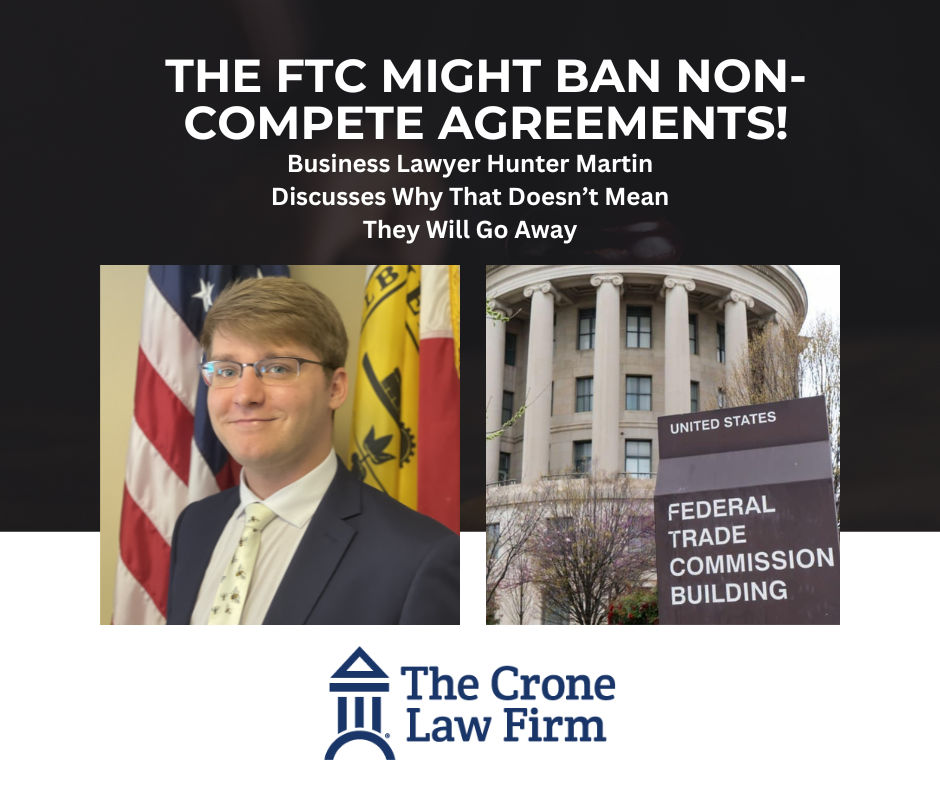The Federal Trade Commission (FTC)—the governing body tasked with promoting consumer protection and competition—is currently deliberating on a proposed rule that would ban non-compete clauses in employment contracts, with a decision on a final rule to be decided in April of 2024. Non-compete clauses are contractual terms entered into between employers and employees that prevent workers from working for a competing employer, or starting a competing business within a stated period of time and geographical location.
The history of non-compete clauses can be traced back as far as the Roman Empire, where artisans and craftsmen were bound by agreements prohibiting them from practicing their trade within a certain geographic area and for a specified period of time after leaving their employer to ensure a stable supply of skilled labor. In today’s world, non-compete clauses have become only more prolific in the employment context.
The general idea behind non-compete clauses is to protect proprietary information from being disclosed to competitors, or being used against an employer to harm their business. Throughout the 20th century, they became increasingly more common in the United States, and particularly in the rapidly evolving realm of technology, finance, and medicine. These clauses were used to protect companies and ensure their trade secrets would not be disclosed or used against them by their competitors. Although the use for non-competes can be beneficial, their prevalence in the employment context has drastically increased to the point where the burden placed on an employee—limiting their ability to perform similar work for long periods of time within a specified geographical location—outweighs the benefits of protecting trade secrets to an employer, even when the employer has no legitimate trade secret to protect!
Today, the FTC estimates that one in five Americans are bound by non-compete clauses. These clauses drastically limit an employee from seeking employment with competitors, and limits their ability to practice their trade. There is no “standardized” non-compete clause; employers are free to pick and choose the duration and scope of their non-compete clauses, so long as the restrictions are “reasonable.” But what is “reasonable” is a highly debated topic in the law, and often comes down to who has a better argument.
In Tennessee, a court will determine the reasonableness of a non-compete clause by looking at a number of factors.
- First, a court will look to see if the clause is protecting a legitimate business interest, such as trade secrets, confidential information, customer relationships, or any sort of specialized training that is unique to the employer.
- Second, the court will look at the geographic scope of the non-compete clause and the duration of the restriction.
- Third, a court will look at the scope of the activity being restricted, and determine whether the restriction is reasonably necessary to protect the employer’s interest.
- Fourth, a court will consider whether the restriction is supported by adequate consideration, i.e. whether the employee received something of value in exchange for the restriction, such as additional compensation, access to confidential information, specialized training, or any other benefit.
- Finally, a court will consider the public interest and the potential impact that enforcement of the non-compete could have on competition, economic growth, and the ability of an employee to freely work within the state.
Although Tennessee has somewhat of a process for determining the viability and legitimacy of non-competes and provides some checks-and-balances to non-competes, the laws vary from state to state; a non-compete clause that may be unenforceable in Tennessee could just as likely be determined as enforceable in Arkansas, or Mississippi. This discrepancy has led the FTC to initiate discussions on the regulation of non-compete clauses and determine their applicability. The FTC recognizes the overreaching impact that non-compete clauses pose in limiting employees from practicing their crafts, but also recognizing that in some instances, non-compete clauses can help employers protect their interests.
If the FTC approves the rule to ban non-competes, it will certainly be challenged in courts across the country. Some companies, in expectation that the rule will take effect, have already began to attempt to work around non-competes by incorporating similar, but legally different, restrictions in other restrictive clauses such as non-solicit clauses, which prevent employees from soliciting customers or other employees from their previous employers for a specified period of time.
Regardless of the FTC’s decision in April, it is always better to have an attorney review your employment contract if there are any similar restrictive clauses so you fully understand what rights you would be giving up. Non-compete clauses can drastically limit your ability to work in your profession once you decide to leave an employer, and it is important to make sure you understand what it is you are signing to make sure you are agreeable with the terms. The attorneys at The Crone Law Firm, PLC are always available to assist you in understanding your contractual obligations, and are happy to assist in negotiations with employers to protect your interests.


